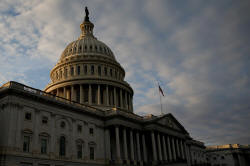Deal to avert U.S. default, raise debt limit faces test in Senate
 Send a link to a friend
Send a link to a friend
 [December 09, 2021] By
Richard Cowan [December 09, 2021] By
Richard Cowan
WASHINGTON (Reuters) - A deal between the
top Democrat and Republican in the U.S. Senate to help raise the federal
government's $28.9 trillion debt limit will be tested on Thursday when
the full chamber votes on whether to approve the measure.
The House of Representatives on Tuesday approved an unusual bill, agreed
to by Senate Majority Leader Chuck Schumer and Minority Leader Mitch
McConnell, to sidestep the Senate's "filibuster" rule and ultimately
raise federal borrowing authority by a simple majority vote.
That deal comes just two months after Congress agreed on a short-term
lift to the debt ceiling, to avert an unprecedented default by the
federal government on its obligations, which would have catastrophic
implications for the world economy.
Republicans have been trying to withhold their votes for more borrowing
authority, contending the increase would smooth the way for passage of
President Joe Biden's $1.75 trillion "Build Back Better" domestic
investment bill, which they oppose.

Democrats note that the legislation is needed to finance debt largely
incurred during Donald Trump's administration, when Republicans
willingly jacked up Washington's credit card bill by about $7.85
trillion, partly through sweeping tax cuts and spending to fight the
COVID-19 pandemic.
"Soon we'll be able to cross off another major item off our December
to-do list," Schumer said on Wednesday, referring to the upcoming debt
limit legislation.
But some Senate Republicans, looking to score political points by
blaming Democrats for spending, objected to the deal. Republicans
contend that "irresponsible," "socialist" spending pushed by Biden is
fueling the need for the debt limit increase.
Treasury Secretary Janet Yellen has urged Congress to act by Dec. 15,
and the Bipartisan Policy Center think thank warned last week that the
government could risk default by late this month if Congress does not
act.
[to top of second column] |

The U.S. Capitol building is seen in Washington, U.S., November 16,
2021. REUTERS/Elizabeth Frantz/File Photo

Democrats noted that they had voted in the past to authorize debt ceiling hikes
to cover Republican measures, such as the Trump tax cuts.
FIRST STEP
If the Senate passes the measure allowing a simple majority vote to raise the
borrowing limit, both chambers will have to vote on another piece of legislation
to actually lift the debt limit.
The draft bill still must plug in a dollar amount for the new statutory debt
limit, which likely is being calibrated to give the government enough borrowing
authority to extend beyond next November's congressional elections.
If Thursday's vote fails, lawmakers will have to scramble to find a backup plan.
"Every single Senate Democrat will have to put their name to the gigantic dollar
amount of debt they’re prepared to pile on the American people," McConnell said
in a speech on Wednesday.
Democrats insist their domestic spending initiatives would be paid for largely
by tax increases on the wealthy and would expand healthcare for the elderly,
help poor children and address urgent climate change programs.
If the Senate on Thursday passes the first step in the process with at least 10
Republicans joining the 50 Democrats and independents, it then goes to Biden for
signing into law. Schumer then intends to pass the debt-limit implementing bill
before next Wednesday.
(Reporting by Richard Cowan, David Morgan and Susan Cornwell; Editing by Scott
Malone and Peter Cooney)
[© 2021 Thomson Reuters. All rights
reserved.] Copyright 2021 Reuters. All rights reserved. This material may not be published,
broadcast, rewritten or redistributed.
Thompson Reuters is solely responsible for this content.
 |